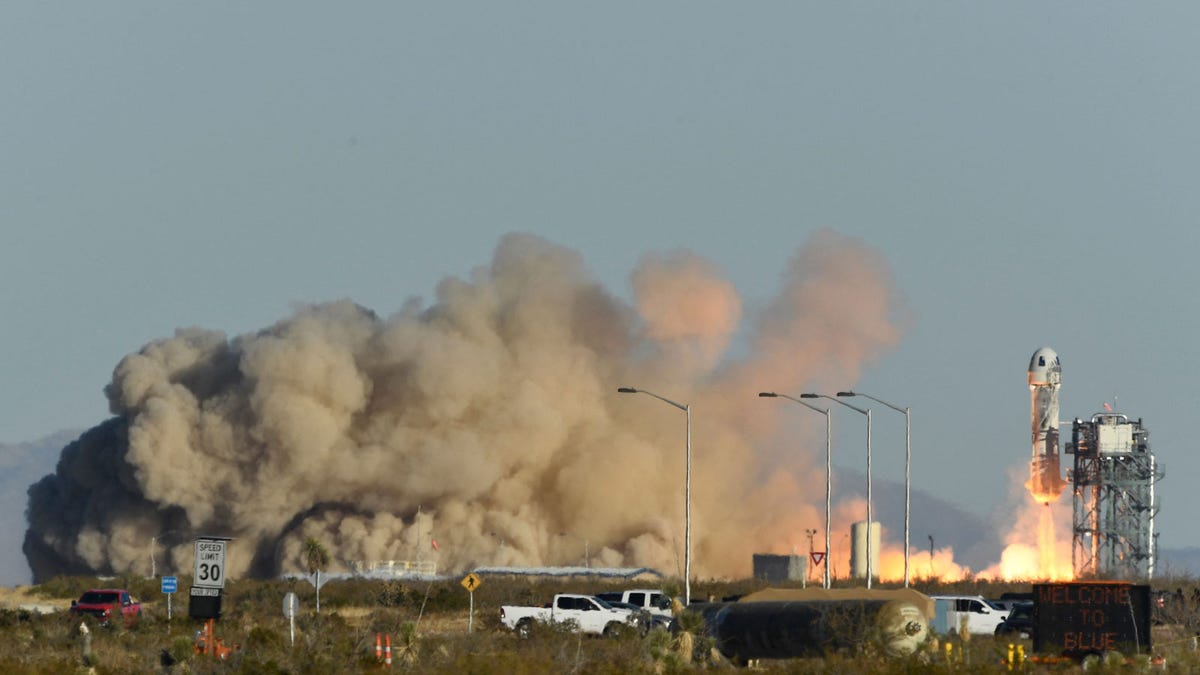Sooty Emissions from Private Space Flight Are Way Worse Than We Thought

This might not be great for the planet, who knew! Photo: Patrick T Fallon/AFP (Getty Images)
I don’t know about you, but when Jeff Bezos and Richard Branson were caught in their race to be the first billionaire in space, I wasn’t excited. It didn’t feel like a great leap forward for humanity or anything lofty like that. Instead, it just felt like a bunch of rich kids finding a new way to mess up the planet. And I was right to be worried, as it turns out that emissions from private space flight are way worse than we thought.
This is all according to a new report from a few high-profile universities around the world, including UCL in London, the University of Cambridge in, erm, Cambridge, and the Massachusetts Institute of Technology (MIT).
Researchers from these three institutions studied the emissions from rocket launches 2019. This included gasses emitted by the rocket engines, as well as particulate matter kicked out during liftoff and re-entry.
Soot and chlorine and water, oh my! Photo: Red Huber (Getty Images)
In order to calculate the impact space travel might have, the researchers collected information on the chemicals released by all 103 rocket launches that took place in 2019. They noted that, at this time, none of the launches were dedicated to space tourism.
Researchers then compared the emissions with recent private space flight demonstrations from Virgin Galactic, Blue Origin and SpaceX, as well as proposals to begin daily rocket launches, to plot what potential future emissions might look like. And it’s not good.
According to Treehugger, a traditional rocket launch kicks out gases like nitrogen oxide and water vapor. But private flights from the likes of Virgin Galactic and SpaceX also release carbon particles, better known as soot, as well as chlorine and alumina particles.
This doesn’t look like a viable mode of transport for the masses.Photo: David Lienemann (Getty Images)
And while all of those emissions are far from great for the planet, it’s the carbon particulates emitted by burning solid fuels that the researchers warned are the biggest factor in the rising environmental impact of space travel. According to experts at UCL:
“The team found that black carbon (soot) particles emitted by rockets are almost 500 times more efficient at holding heat in the atmosphere than all other sources of soot combined (surface and aircraft) – resulting in an enhanced climate effect.”
The team warned that global warming due to soot could “more than double” after just three years of additional space flight due to tourism. It specifically cited private launches from Virgin Galactic and SpaceX, as they use kerosene and synthetic rubber fuels to power their crafts.
This boom in emissions due to the fuel of choice for SpaceX isn’t a good look for a firm that shares its CEO with EV maker Tesla. Boss Elon Musk has repeatedly claimed that his stratospheric ambitions will benefit the future of the planet, but that only works if there’s still a planet to save in the years to come.
A perfect line showing all the spots this SpaceX rocket left soot on its way to space. Photo: Red Huber (Getty Images)
What’s more, the impact of these soot emissions could be even worse for global warming, as they are “directly injected into the upper atmosphere.” This, the researchers warn, compounds their effect on the climate as they are “500 times more efficient at retaining heat.”
Dr. Eloise Marais, study co-author from the UCL Geography department, said: “Rocket launches are routinely compared to greenhouse gas and air pollutant emissions from the aircraft industry, which we demonstrate in our work is erroneous.
“Soot particles from rocket launches have a much larger climate effect than aircraft and other Earth-bound sources, so there doesn’t need to be as many rocket launches as international flights to have a similar impact. What we really need now is a discussion amongst experts on the best strategy for regulating this rapidly growing industry.”
Apollo used kerosene for its launch, then switched to cleaner-burning hydrogen as fuel. Photo: NASA / AFP (Getty Images)
So the big question is, how much of this space travel is really necessary? And, is there a way to clean up any missions into orbit that actually are benefitting the planet?
NASA has used hydrogen as rocket fuel for decades, with the Apollo missions to the moon using the gas as fuel for their second and third stages. Burning hydrogen creates water vapor, so doesn’t dump soot into the earth’s atmosphere like kerosene and synthetic rubber does. Could a change in fuel be needed for anyone that desperately has to go to space?



